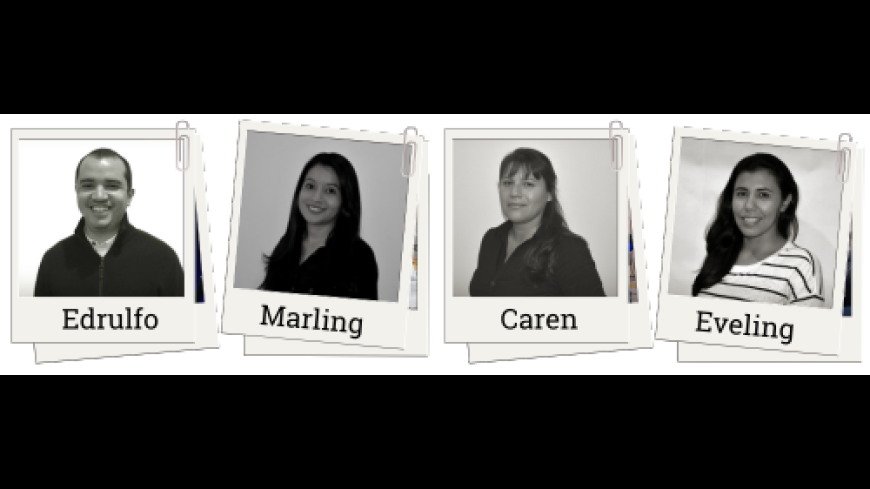Edrulfo Rodriguez: Work that empowered communities in Nicaragua
One water and sanitation project taken on by Engineers Without Borders-Nicaragua seems simple enough: Help a rural community 30 minutes from the nearest city build 10 sanitary latrines for its residents to use.
Simple at first glance, but the project’s impact proved to be even more significant after staff from the in-country office arranged for a meeting between community members and the town’s mayor. During that session, residents detailed to the official their need for improved sanitation and a new water source.
When it ended, the mayor agreed to provide an additional 30 latrines and a new drinking water well.
With that single meeting, the project became much more than a mere water and sanitation engineering project. Community members realized they actually could meet one-on-one with their elected officials to express their needs. Edrulfo Rodriguez, Nicaragua Country Manager for EWB-USA arranged the meeting and was on hand for it. “Our work,” he says of EWB-USA, “results in empowering communities.”
Now, after a decade of service that delivered more than 60 projects benefiting nearly 60,000 people in 78 communities, the Nicaragua office is shutting down, the result of pressures that made its work increasingly difficult to accomplish.
“For 10 years we worked to give more voice to community members,” Rodriguez says.
Listening to Communities
In 2015 EWB-USA opened its first country office in Nicaragua. That was followed by offices in Guatemala (2016), Uganda (2018), and Ecuador (2020).
The country office model proved transformative both for engineering projects undertaken in countries like Nicaragua and for EWB-USA. Rodriguez and his team worked to ensure that engineers and allied professionals met regularly with community members to help ensure that projects were designed, built, and delivered with as much local input as possible.
In that way, the office led a bold shift toward localization: forging trust and community-driven solutions from the ground up. Early-stage project assessments included not just engineering details but also an effort to achieve a deeper understanding of community sentiments and aspirations.
In that way, Rodriguez says, community voices could be heard early in the project development timeline. The approach to deep community involvement recognizes that “the social side and the engineering side need to be hand in hand,” he says.
Crisis Drives Innovation
The Covid-19 pandemic led to still more innovations from the Nicaragua office.
After all, critical engineering needs did not end with the pandemic. Travel restrictions, however, made it all but impossible for volunteers to reach Nicaragua to complete projects. For example, in the village of El Llanito, a community of 1,200 people some 120 miles east of the capital Managua, volunteers from the EWB-USA chapter at the University of California, Berkeley were working before the pandemic to install a water pumping, storage, and distribution system.
Women and children from the village typically walked miles each day to gather water while the men worked in the fields. Rodriguez recalls that children would carry as many as four gallon-sized buckets of water on poles across their shoulders while women balanced 5-gallon buckets on their heads.
“It’s a skill that life forced them to develop,” he says.
But midway through the project’s implementation, the coronavirus pandemic struck, leaving the U.S.-based volunteers unable to travel. Rodriguez quickly made arrangements with volunteer leadership at the university to keep the project on track. Work was supervised by local construction expert Eveling Rodriguez, who was on site for all critical milestones. The remote work model involved weekly, sometimes daily communication via WhatsApp (and GoogleTranslate) to resolve issues, approve material purchases, and manage other critical tasks.
“We accomplished a lot through this model,” Edrulfo Rodriguez says.
Through necessity, the Nicaragua office piloted the remote implementation model for all of EWB-USA. This model has since been adopted and used by other chapters working in various countries. At times, the model has helped chapters continue implementation through periods of adversity, like health-related travel restrictions or in-country political tension. At other times, it has allowed chapters to shift funds that would have been spent on travel into the project infrastructure, resulting in better outcomes for the communities. While nothing replaces in-person connection, the remote model piloted by the Nicaragua country office has had a positive impact throughout the EWB-USA ecosystem.
The Nicaragua office’s track record of successful project delivery over the past decade is one source of pride, Rodriguez says. He also is proud that he and his team advocated strongly for community building and local partnerships.
“Looking back 10 years later, I couldn’t be prouder of what we’ve accomplished,” Rodriguez says. What began as a pilot project—an experiment to improve the efficiency and quality of EWB-USA’s work in Nicaragua and elsewhere—grew into “something that exceeded expectations.”
